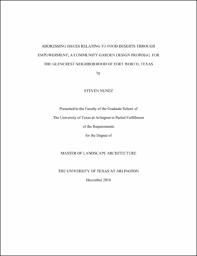
ATTENTION: The works hosted here are being migrated to a new repository that will consolidate resources, improve discoverability, and better show UTA's research impact on the global community. We will update authors as the migration progresses. Please see MavMatrix for more information.
Show simple item record
| dc.contributor.advisor | Allen, Diane Jones | |
| dc.creator | Nunez, Steven | |
| dc.date.accessioned | 2019-02-26T22:20:46Z | |
| dc.date.available | 2019-02-26T22:20:46Z | |
| dc.date.created | 2018-12 | |
| dc.date.issued | 2018-12-10 | |
| dc.date.submitted | December 2018 | |
| dc.identifier.uri | http://hdl.handle.net/10106/27783 | |
| dc.description.abstract | The high rate of population growth in urban areas over the past century has contributed to the creation of food deserts, which are areas characterized by the lack of access to affordable fresh and healthy foods. Food deserts, also known as low-access communities, are believed to be linked to food insecurity and diet related health issues such as obesity, diabetes, and cardiovascular disease. The United States Department of Agriculture (USDA) estimates that approximately 23.5 million Americans live in food deserts, often occurring in historically disadvantaged neighborhoods (USDA, 2009).
Introducing full-service grocery stores to these areas is frequently promoted as the solution to food desert issues. However, research shows that solely introducing full-service grocery stores to these areas has a minimal effect on the food choices and buying habits of the local residents (Wright, J., Donley, A., Gualtieri, M., Strickhouser, S., 2016). Additional factors that contribute to food desert issues include income, education, limited mobility, and overall general health (Morris, 2013).
The purpose of this thesis is to examine how urban agriculture can empower people to holistically address the factors that contribute to food desert issues. Through literature review and precedent study analysis, we were able to identify community gardens as the most effective form of urban agriculture practice in addressing food desert issues, as well as determine the essential programmatic elements to include in the function of a community garden. Moreover, surveys and extensive analysis of the study area were conducted to develop a design proposal and identify the best location for the implementation of a community garden in a local USDA identified food desert, the Glencrest neighborhood of southeast Fort Worth, Texas. | |
| dc.format.mimetype | application/pdf | |
| dc.language.iso | en_US | |
| dc.subject | Food deserts | |
| dc.subject | Urban agriculture | |
| dc.subject | Community gardens | |
| dc.title | Addressing Issues Relating to Food Deserts Through Empowerment; A Community Garden Design Proposal for The Glencrest Neighborhood of Fort Worth, Texas | |
| dc.type | Thesis | |
| dc.degree.department | Landscape Architecture | |
| dc.degree.name | Master of Landscape Architecture | |
| dc.date.updated | 2019-02-26T22:20:53Z | |
| thesis.degree.department | Landscape Architecture | |
| thesis.degree.grantor | The University of Texas at Arlington | |
| thesis.degree.level | Masters | |
| thesis.degree.name | Master of Landscape Architecture | |
| dc.type.material | text | |
Files in this item
- Name:
- NUNEZ-THESIS-2018.pdf
- Size:
- 10.98Mb
- Format:
- PDF
This item appears in the following Collection(s)
Show simple item record


